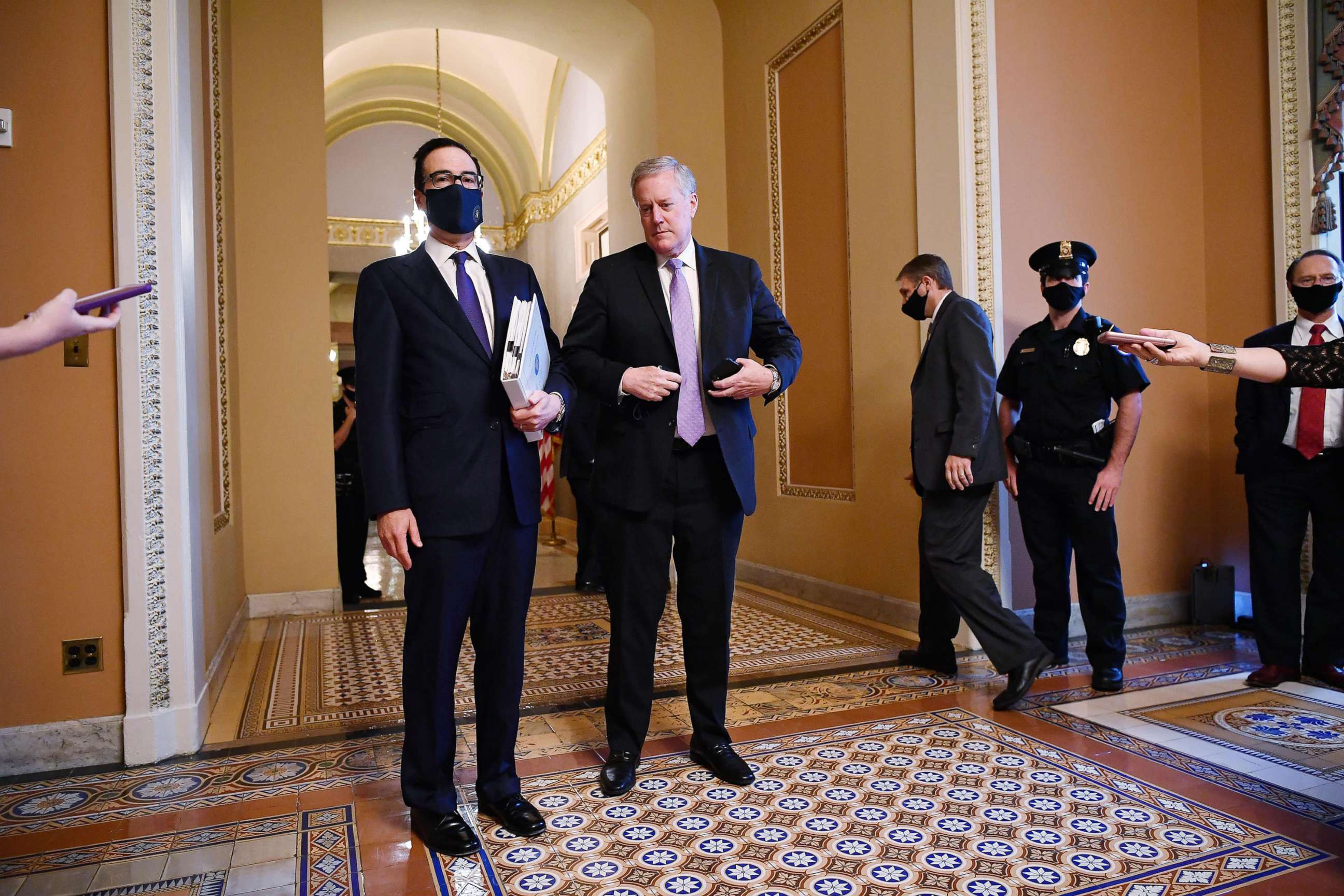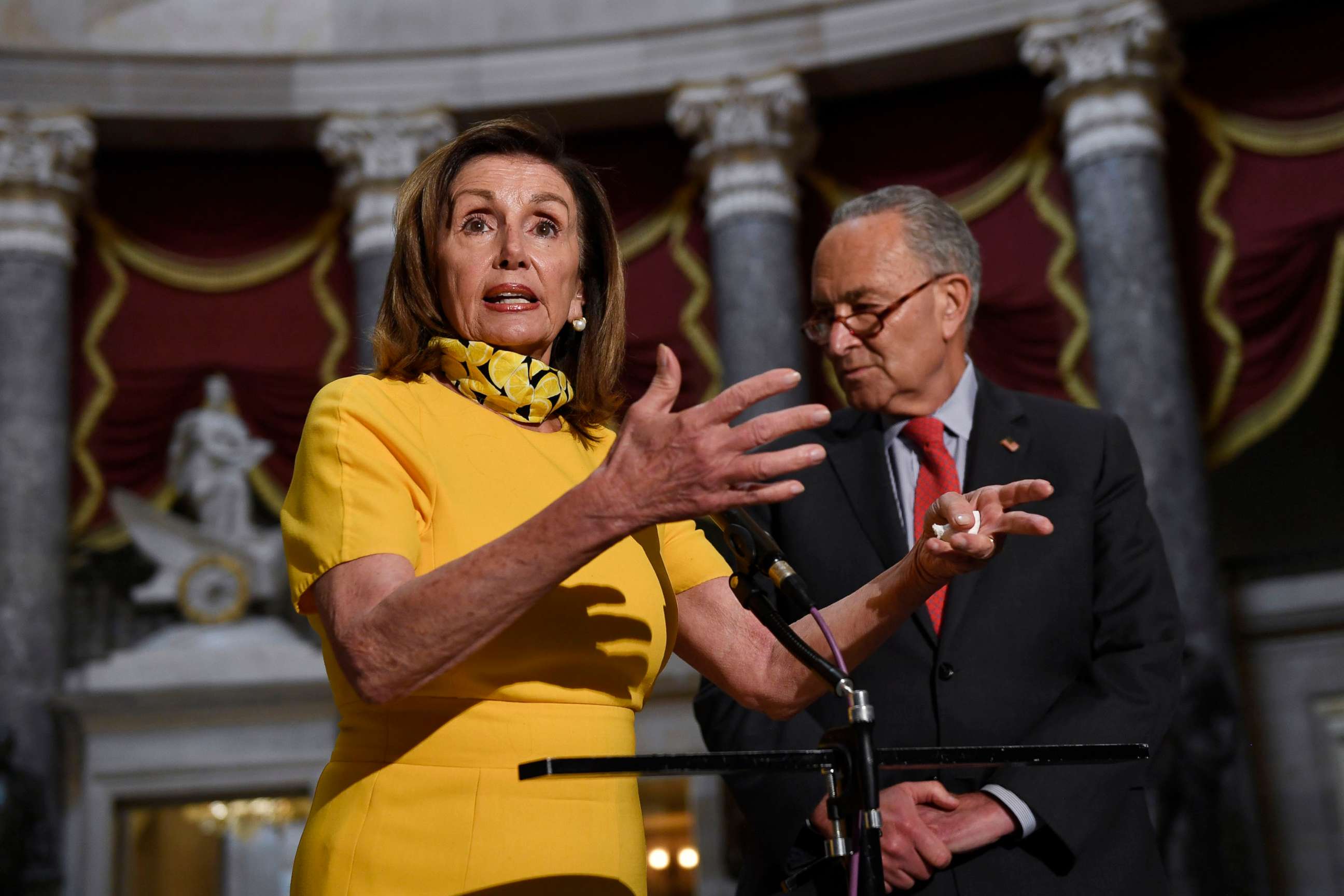Coronavirus relief negotiators set deadline for a deal by week's end as Dems add $300B for schools to their pitch
Increasingly, senators are saying the monthlong August recess must be delayed.
A week of bipartisan talks between the White House and Democratic leaders has shown little-to-no sign of progress, but Treasury Secretary Steven Mnuchin told reporters after talks with Democrats on Tuesday that the two sides had agreed to try to reach a deal by week's end -- if a deal was even possible.
"We're going to work around the clock the next few days to see if we can bridge the issues," Mnuchin said. "Some issues we've been able to agree on. Some significant issues are still open."
"I would characterize the conversations as productive and a step in the right direction. Probably the most productive meeting we've had today," said White House Chief of Staff Mark Meadows, who has joined Mnuchin for the week of bipartisan talks.

"They made some concessions, which we appreciated. We made some concessions, which they appreciated," Sen. Chuck Schumer said following the 90-minute meeting, while not offering specifics. "We're still far away on a lot of the important issues, but we're continuing to go at it. From my view the fundamental disagreement: the scope and depth of the problem and its solution."
But part of that solution for Democrats, House Speaker Nancy Pelosi said after the talks, is forcing the administration to come up with a comprehensive plan for virus testing, something Democrats have sought unsuccessfully for months. The administration has, to date, resisted such pressure.
"We're insisting on that in terms of a strategic plan for testing, tracing, treatment, isolation, masks, sanitation -- all that it takes to hold this in check until, God willing and science providing, we have a vaccine soon," the speaker told reporters. "So this is -- it's hard -- and in some cases we're inching along, in others we're making more progress, but it takes time and we'll take more time tomorrow."
This slight progress Tuesday night comes after Republican senators -- leaving a closed-door GOP lunch earlier in the day -- said Mnuchin told their conference that no headway had been made.
"He didn't think they were any closer to a deal now than this time last week," recounted Sen. Josh Hawley, R-Mo.
Sen. Kevin Cramer, R-N.D. said, "There was a lot of discussion about a lack of progress."
Meanwhile, ABC News has learned that Democrats have upped their demand for school aid by an additional $300 billion in the talks with the administration officials, according to a senior source familiar with the matter. That's three times the amount passed in May by the House in their $3.4 trillion coronavirus relief bill. A congressional aide told ABC News that Democrats brought data to back up their push for more school money to their meeting with the administration on Monday afternoon, after initially broaching the topic on Saturday with Mnuchin and Meadows. House Speaker Nancy Pelosi relayed this to Democrats on her caucus call that night, according to the source.
Sen. Roy Blunt, R-Mo., who was central to crafting the $105 billion education portion of the GOP coronavirus aid bill known as the HEALS Act (Health, Economic Assistance, Liability Protections & Schools), told reporters, "The Democrats said, 'We were off a little bit. We need $400 billion, not a hundred billion.'"
"I want my school to make all the investments necessary to keep them safe and what we know is that safety for kids doesn't magically fall from the tree. You have to pay for it," said Sen. Chris Murphy, D-Conn., a father of two children who attend public school. "Masks and gloves and sanitizer and cleaning supplies -- they cost money. Adjustments to school buildings to create enough social distance to comply with CDC regulations -- that costs money. Hiring additional teachers and support staff to keep schools safe -- that costs money."
"If you open up a school that's not safe, inevitably, kids, teachers will get COVID(-19), and they'll have to close them right back down," Schumer said at a news conference Tuesday afternoon before his meeting with Mnuchin and Meadows.
In the face of near-partisan gridlock, the White House has threatened executive action to address expired federal jobless benefits.
When asked if the presidential move was still on the table, Mnuchin replied, "Absolutely."
ABC News has learned the administration is contemplating redirecting already approved congressional funding to federal unemployment benefits, this according to two sources familiar with the matter, who added that the White House counsel's office was currently working through the legality of the move. The Washington Post first reported the potential executive action.
From unemployment insurance benefits to school funding to more aid for state and local governments, the two sides remain far apart, and with Republicans far from unified on their own position, the math was all the more complicated for a deal.
"I think I've made it very clear for some time now, if you're looking for a total consensus among Republican senators, you're not going to find it. So we do have divisions about what to do," Senate Majority Leader Mitch McConnell told reporters. "What we're hoping for here is a bipartisan proposal negotiated by the president of the United States and his team, and can sign a bill into law, and the Democratic majority in the House that can appeal to a significant percentage of Republicans in the House and Senate. That's where we are."
McConnell, once again, suggested a short-term fix for unemployment benefits while a longer-term deal remains difficult to achieve quickly. But Democrats have rejected that approach, and the administration has focused this week more on a sweeping compromise, however elusive that has proven to be.
Schumer said he was still "hopeful for a deal," but with an impasse at the leadership level, rank-and-file members were getting restless and beginning to negotiate amongst themselves to try to break through the logjam, ever conscious of the political peril in any failure.
"I've been talking to members on the other side of the aisle about what we might do as individual members to help facilitate a little more progress," Sen. Lisa Murkowski, R-Alaska told reporters. "As I look to where we are, I feel the same discouragement, desperation, despair that we're here on the fourth of August. We don't have answers for people right now. So, we're gonna keep working."
Sen. Rob Portman said he is talking to about a dozen Democrats to try to find common ground on one of the biggest ticking points -- a federal, expanded unemployment insurance benefit that is lower than the $600 per week paycheck that just ran out for some 30 million Americans.

One Republican senator with knowledge of the bipartisan talks said, "Democrats are floating different ideas. Some like the return-to-work bonus" -- a roughly $450 per week payment for returning to work proposed by Portman, and some are looking at gradually tapering down the weekly federal jobless benefit, among other ideas.
But time is running out, and frustration is mounting.
Increasingly, senators are saying that the monthlong August recess -- which is set to begin Friday -- must be delayed if a deal cannot be reached by week's end, something that appears highly unlikely at this point.
"How do you think it looks for us to be back home when this is unresolved? This is the most important thing we need to be doing," said Sen. John Cornyn, R-Texas, who is up for re-election.
"I think we ought to stay until we get a deal," said Sen. Rick Scott, R-Fla.
Some Republicans said if no deal materializes soon, they may start to put their own proposals on the floor to show they are trying to get something done -- this ahead of crucial elections in just three months that might change the balance of power in the Senate.
"There's ... a desire to get our stuff on the floor, and whether it's a skinny bill or something that resembles a HEALS Act or something that we start to put on the floor, start debating. I think there's a little bit of pent up anxiety to do that," said Cramer.
But any partisan move might poison the well for bipartisan talks, though leaders cautioned that the same unanimity of action that saw virtually no opposition to trillions of relief back in March in order to rescue the flagging economy was nowhere near reality now.
"I don't think we're going to have a total consensus in this round. The atmosphere is much more partisan than it was back in March and April, that much closer to the election," McConnell warned, before calling on Democrats to slash $1 trillion from their proposal, money that he said was "unrelated to the problem."
ABC News' Benjamin Siegel and Mariam Khan contributed to this report.
What to know about the coronavirus:
- How it started and how to protect yourself: Coronavirus explained
- What to do if you have symptoms: Coronavirus symptoms
- Tracking the spread in the U.S. and worldwide: Coronavirus map
Tune into ABC at 1 p.m. ET and ABC News Live at 4 p.m. ET every weekday for special coverage of the novel coronavirus with the full ABC News team, including the latest news, context and analysis.




